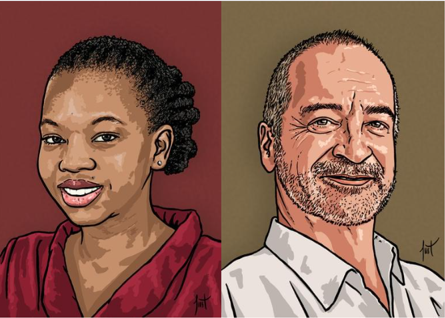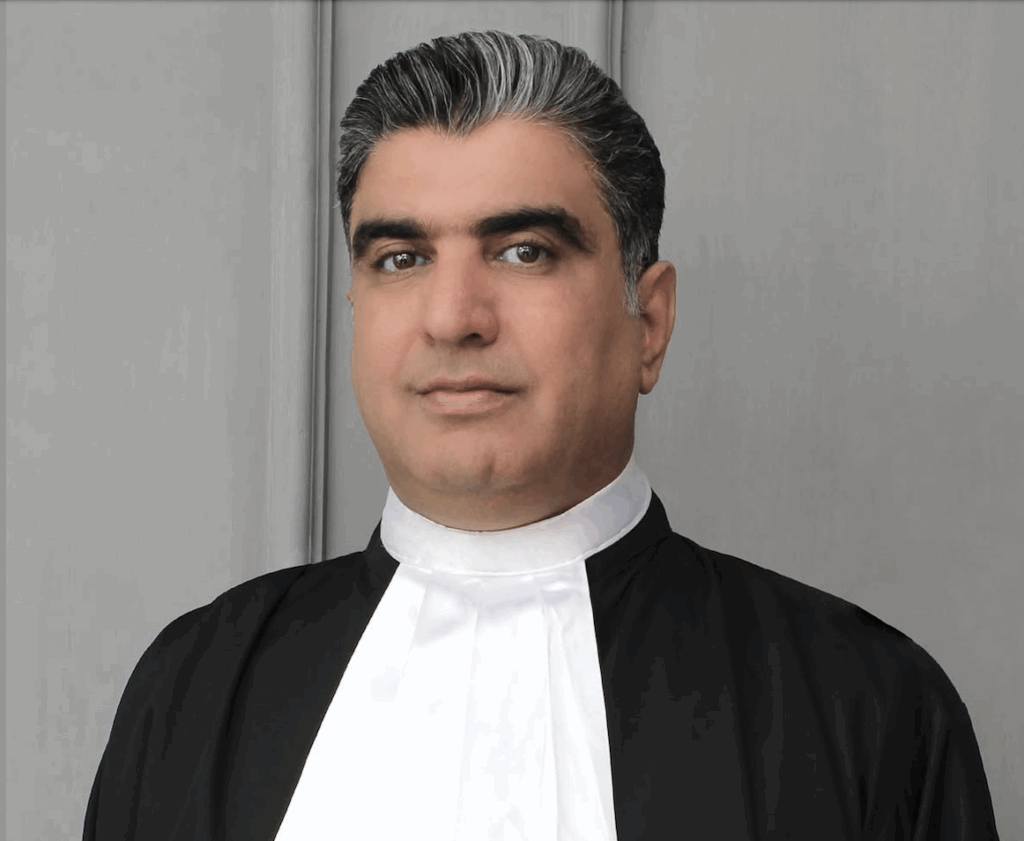Brandon Abdinor became aware of the dependency of the world civilization on fossil fuels at a young age and is now a passionate climate advocacy lawyer. Thobeka Gumede initially chose environmental law out of curiosity, as it was the least chosen topic in law school. It opened her eyes to environmental abuses, including in her own community. “I always knew I wanted to help people, but I was never aware of human rights violations connected to the environment.” Ms Gumede and Mr Abdinor’s pathways crossed at the Centre for Environmental Rights (CER) in Cape Town. At CER, lawyers work in close relationship with local communities and civil society organisations in South Africa to realise the constitutional right to a healthy environment by advocating and litigating for environmental justice. In their work as environmental lawyers, Mr Abdinor and Ms Gumede often encounter sophisticated challenges.
Many communities in South Africa suffer from water scarcity. The local municipalities are required to manage the availability of water taps, but, in reality, some communities have been living in “day zero” for years. The Department of Water Affairs and Sanitation is one of the most dysfunctional departments of the country due to capacity issues. “The legal framework around water is not bad,” explains Mr Abdinor, “but protection of strategic water source areas and how they are looked at t in environmental impact assessments, is”.There is a strong need to develop public interest law capacity around water.. Already, however, there are many linkages between water issues and legal cases on fossil fuel projects. For example, the mining team of CER has been involved for over 7 years in litigation against the intention to permit a coal mine in a strategic water area.
One of the main focus areas of CER, is fossil fuels. The overall policy in South Africa aims for a fossil fuel phase down and then phase out and says that renewable energy is the way forward. In practice, however, and also in its public proclamations, sections of the government still actively support and facilitate the fossil fuel industry. In addition, various technical and regulatory issues stand in the way of bringing renewables onto the transmission grid. A regulatory push is required to make renewables more accessible and democratic.
In addition, it is vital that communities that face or may face environmental challenges, are empowered with knowledge about the consequences thereof. Knowledge on linkages with climate change, as well as clear and understandable language around the energy sector is important, emphasises Ms Gumede. A large part of Ms Gumede’s work focusses on training local communities and making them aware of the possible environmental impacts when, for example, their land is intruded upon by mining companies. And on making them aware of their environmental rights. Ms Gumede and her team make sure that everything involved is understandable for the affected communities. Explaining to a community with a high unemployment rate that there is a reason why their environment is a declared protected area, and that a fossil fuel development is not going to benefit the community in the long run, can be challenging. “Fundamentally, we take an approach to not trying to convince or persuade people, but rather make the information available so that people can make their own minds up about the costs and benefits of developments.,” Mr Abdinor explains. “At CER we are trying to ‘be there’ for the communities and to assist and provide information when asked. It is necessary for us to understand the community dynamics,” Ms Gumede adds. This illustrates a complex challenge for environmental lawyers: some community members tend to label environmental lawyers as ‘anti-development’, which creates fear for loss of trust in their work. In one of the mining case that CER has worked on for example, some community members invaded the training space of CER. The invading members claimed that the mining project would save the community from unemployment. CER then found itself in a hostile environment, and not only were the lawyers themselves threatened, but if they continued with the training, it would also put the community members who were willing to be trained at risk. Ms Gumede and her team decided to take a step back. “It is sometimes easier to engage with communities who are already impacted and who, as a result of the operations, no longer have access to water, or who suffer from breathing problems due to air pollution, and that is so unfortunate”.
Apart from litigation and campaigning work to address environmental issues, CER’s corporate accountability and transparency program occupies itself with raising awareness about environmental impacts to stakeholders such as banks who invest in unsustainable projects. “Do you as a bank want to put your reputation at risk…?” are common questions asked by CER. “Of course we have to be very careful: we need to be clear that whatever we write is correct in fact and in the law”, explains Mr Abdinor. Environmental lawyers in South Africa face a constant risk of defamation cases. “Receiving such letters from opposing parties creates a type of pressure. And this pressure has been increasing. We are very fortunate that there have not been more SLAPP (Strategic Litigation Against Public Participation) cases against public interest lawyers”, witnesses Mr Abdinor. He refers to the SLAPP suit that was initiated six years ago by Mineral Sands Ltd. et al. against, among others, environmental lawyers at CER. In a landmark ruling from the Constitutional Court, defendants were vindicated in their claims that the plaintiffs were employing SLAPP tactics. The Constitutional Court recognised that SLAPP suits appear to be on the increase, both in South Africa and globally. The Court delivered an important precedent by ruling that the common law doctrine of abuse of process can accommodate the SLAPP suit defence and, ultimately, ensure “that law services its primary purpose, to see that justice is done, and not to be abused for odious, ulterior purposes“.[1]
Another challenge perceived by the environmental lawyers at CER, is maintaining a constructive and engaging relationship with the South African government. Recently, the South African Minister of Mineral Resources and Energy claimed that environmental NGOs are inappropriately blocking development.. “Unfortunately this narrative is not new, and seems to be on the increase. The truth of the matter is that it is under the framework environmental laws that most of the risks, as well as the needs and desirability, of projects are most fully assessed.”. “Our relationship with the Department of Environmental Affairs definitely goes through easier and more challenging cycles.: we are often in court as opponents regarding climate change and environmental cases, but we also see a welcome openness to engage at times. At CER we work together with various scientific and other experts, and we share the reports and information with government decision-makers and policymakers. The government often takes this technical information into account in new decisions”. Ms Gumede adds that in one of their projects, they have collaborated with several departments in the creation of a platform for communities to report environmental violations. This collaboration has provided CER with access to engage with the departments on their role on compliance monitoring and enforcement. “A next step is to get the departments to actually take action to tackle the issues”.
Environmental lawyers in South Africa and especially in the social justice sector are doing challenging but amazing and rewarding work. “We are not typical lawyers who stay in the office and take instructions, but we go out there, speak to communities, talk to stakeholders in the sector, and above all try to make a difference”. Ms Gumede continues that it is quite important to make sure that whenever they venture into risky territory, they stay focused on what their clients are fighting for, and to not prioritise their own strategies as lawyers. “As lawyers we play an essential role in expanding our legal arguments and keeping pressure on the implementation of environmental legislation. We are always trying to push boundaries. For example, mining is now a subject in national environmental legislation because of a long fight by CER: it used to have its own exceptional standards, which are now abandoned,” Mr Abdinor informs. “We are also fortunate that there is always the constitution to rely on. Our constitution is always under development.”
According to Mr Abdinor and Ms Gumede an important consideration for environmental lawyers is to explore and, along with communities and other stakeholders, co-create solutions and better alternativesto environmentally destructive development. Education, awareness raising and sharing knowledge about the legal aspects works hand in hand with inclusive dialogue and workshopping to explore a better future. . “So that when we engage with the communities, we can tell them wholeheartedly that there is another way”. Once such example is the #cancelcoal campaign, where expert reports that support the litigation are shared and explained, helping to get useful knowledge to the a broad range of affected people.




